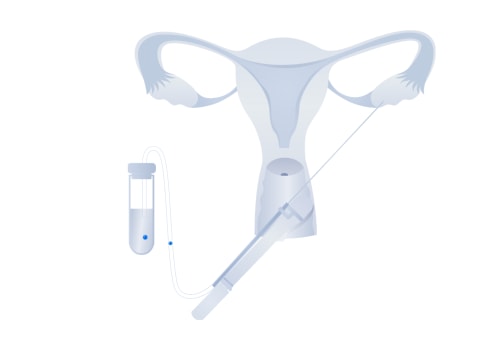For couples struggling with infertility, in vitro fertilization (IVF) can be a powerful tool for achieving their dreams of having a child. In this process, embryos are created in a laboratory and then transferred into the woman's uterus. One technique that has been employed to increase the chances of success is blastocyst culture in IVF. In this article, we'll explain what blastocyst culture in IVF is, why it's used, and what the benefits and potential risks associated with it are.
Blastocyst culture
is a process used in in vitro fertilization (IVF) that helps increase the chances of successful implantation of an embryo.This process involves culturing embryos in the laboratory for an extended period of time, typically five days, in order to help them reach the blastocyst stage. At this stage, the embryo contains more cells and is better developed, making it more likely to successfully implant in the uterus. The procedure for blastocyst culture is relatively straightforward. First, the embryos are transferred to a specialized culture dish and placed in a controlled environment with special nutrients designed to encourage their growth. The dish is then placed in an incubator which maintains an optimal temperature and humidity level for growth.
The embryos are monitored closely over the course of several days to assess their development. Once they reach the blastocyst stage, they can be transferred back to the uterus or frozen for later use. The importance of blastocyst culture lies in its ability to increase the chances of successful implantation. Research has shown that embryos that are cultured to the blastocyst stage have higher implantation rates than those that are not. This is because they are more mature and better developed when they are transferred back to the uterus.
Additionally, blastocyst culture allows for a more precise selection of embryos for transfer, as it allows for better assessment of their development. Although blastocyst culture is generally safe, there are some risks associated with it. These include an increased risk of multiple births, as more than one embryo may be transferred back to the uterus. Additionally, there is a small increased risk of birth defects due to genetic abnormalities in some of the embryos selected for transfer. To minimize these risks, special safety protocols are followed during the blastocyst culture procedure.
Additionally, studies have shown that blastocyst culture does not increase the risk of miscarriage or other adverse outcomes. Blastocyst culture is typically recommended for women who have experienced recurrent miscarriages or implantation failure. This is because the process allows for more precise selection of embryos for transfer, which may help improve implantation rates and reduce the risk of miscarriage. Additionally, blastocyst culture may help reduce the number of embryos that need to be transferred back to the uterus, thus reducing the risk of multiple births. The success rate of blastocyst culture depends on a variety of factors, such as age and fertility status. Generally speaking, however, studies have shown that it has a high success rate and can significantly improve implantation rates compared to traditional IVF procedures.
Additionally, blastocyst culture usually costs less than traditional IVF procedures and has fewer risks associated with it.
Additional Information About Blastocyst Culture
Blastocyst culture is a relatively new technique that has shown promising results in improving the success rates of in vitro fertilization (IVF). Compared to traditional IVF, blastocyst culture has the potential to increase the chances of implantation and live birth. Studies have shown that blastocyst culture can improve implantation rates up to 56%, while traditional IVF has an implantation rate of around 25%.The cost of blastocyst culture varies from clinic to clinic, but it is generally more expensive than traditional IVF treatments. Additionally, there may be additional costs associated with blastocyst culture, such as freezing and thawing or genetic testing of the embryos.Though blastocyst culture is a promising technique, it is important to note that it is still relatively new and further research is needed to better understand its potential benefits and risks. It is also important to discuss any concerns you may have with your doctor before deciding to pursue blastocyst culture as part of your IVF treatment plan.
Risks Associated With Blastocyst Culture
When utilizing blastocyst culture, there are a few potential risks that must be taken into consideration. The most common risk associated with this technique is the potential for multiple births. This is because the process may result in the transfer of multiple embryos to the uterus, thus increasing the likelihood of multiple pregnancies.In addition, there is a higher risk of birth defects with multiple pregnancies, and this should be discussed with a healthcare provider prior to undergoing the procedure. Another potential risk associated with blastocyst culture is the chance of unsuccessful implantation. Blastocyst culture may increase the chances of successful implantation, however, there is still a chance that the embryo may not implant, even after undergoing the procedure. Additionally, due to the nature of blastocyst culture, it is possible for some embryos to be lost during the process. Lastly, there is a small risk of infection associated with blastocyst culture. Although this risk is extremely low, it is important to be aware of it and discuss any possible risks and concerns with a healthcare provider prior to undergoing the procedure.
When is Blastocyst Culture Recommended?
When it comes to IVF, blastocyst culture is often recommended to increase the chances of successful embryo implantation.This technique is typically recommended for women who have experienced recurrent miscarriage or implantation failure. It is also sometimes recommended for women who have a limited number of eggs available, as the process of blastocyst culture can help select the most viable embryos. Blastocyst culture has been studied extensively and has been shown to be a safe and effective technique for increasing the chances of a successful IVF cycle. Studies have shown that this technique can help select embryos with a higher rate of implantation, thus increasing the chances of a successful pregnancy. Ultimately, the decision to use blastocyst culture in an IVF cycle should be made by the patient and her fertility specialist.
The specialist can provide information about the risks and benefits of this technique and help the patient decide if it is the right choice for her.
How Does Blastocyst Culture Work?
Blastocyst culture is a process used in in vitro fertilization (IVF) that helps increase the chances of successful implantation of an embryo. This process involves the growth of embryos outside of the uterus in a laboratory environment for five to six days after fertilization. The first step of blastocyst culture involves transferring the embryos from the culture dish to a special incubator, which is designed to provide the optimal temperature, humidity, and oxygen levels for the embryos. The embryos are then monitored for up to five days to assess their development.If all goes well, the embryos will grow into blastocysts, which are a more advanced form of embryo development. After five to six days, the blastocysts can be biopsied for genetic testing, or transferred into the uterus. The biopsied material can then be used for preimplantation genetic testing. Depending on the results of the genetic testing, some of the blastocysts may be chosen for transfer into the uterus, while others may be discarded. The entire process of blastocyst culture takes five to six days, but it can vary depending on the particular fertility clinic. During this time, it is important to make sure that the embryos are monitored closely for any signs of abnormal development.
What is Blastocyst Culture?
Blastocyst culture is a process used in in vitro fertilization (IVF) to help increase the chances of successful implantation of an embryo.The process begins when a patient undergoes an initial round of IVF, during which their eggs are fertilized with sperm in the laboratory. After the eggs have been fertilized, they are allowed to develop in the laboratory for up to five days. This is when blastocyst culture comes into play. During this stage, the embryos are closely monitored and provided with the optimal environment needed for growth and development.
By the fifth day, some of the embryos will have developed into a blastocyst, which is a ball of cells with a hollow center. These blastocysts are then carefully selected for transfer back to the patient's uterus. The main purpose of blastocyst culture is to help identify embryos that have the greatest potential for successful implantation. By allowing the embryos to develop and grow for five days, doctors can identify the embryos that are most likely to result in successful pregnancies. In addition, this extended period of growth gives doctors the opportunity to identify any chromosomal abnormalities or other issues that may affect a pregnancy.
Blastocyst culture also helps reduce the risk of multiple pregnancies by allowing doctors to transfer fewer embryos. Overall, blastocyst culture is an important part of the IVF process. It helps doctors identify the embryos that are most likely to result in successful pregnancies and helps reduce the risk of multiple pregnancies. Additionally, it allows doctors to provide patients with the best chance for a successful IVF cycle. Blastocyst culture is a process used in in vitro fertilization (IVF) that can increase the chances of successful implantation of an embryo. This technique can be beneficial for certain patients, as it allows for embryos to develop to the blastocyst stage and select the best embryos for transfer.
However, it is important to note that there are risks associated with this technique that should be discussed with a doctor prior to undergoing IVF. Research has shown that blastocyst culture can improve pregnancy rates for IVF patients, especially those who have failed previously or have a history of poor embryo quality. Additionally, blastocyst culture has also been shown to reduce the number of multiple pregnancies and complications associated with them. Overall, blastocyst culture can be a beneficial procedure for certain patients undergoing IVF, with research and studies indicating positive outcomes.











Leave Message